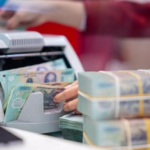In the first quarter, domestic revenue is estimated at VND 4,670 billion, while import-export revenue stands at VND 450 billion. Additionally, contributions and donations amounted to VND 30 billion. Specifically, the Customs Department of Thai Nguyen province alone contributed nearly VND 550 billion as of March 31.
Regarding large FDI enterprises in the province, the Thai Nguyen Customs Department noted that Samsung Thai Nguyen’s products sold in the Vietnamese market incurred VAT, resulting in approximately VND 200 billion in revenue for the quarter. Their exports, however, are tax-exempt. Details regarding Samsung Thai Nguyen’s corporate income tax were not disclosed by the tax department.
Local budget expenditure for the quarter is estimated at VND 3,535 billion. This includes VND 1,010 billion for development investment, VND 2,300 billion for regular expenses, and approximately VND 197.5 billion for National Target Programs, projects, and other tasks.

Thai Nguyen province’s state budget revenue for the first quarter is estimated at VND 5,150 billion.
For the quarter, the province’s total social investment capital is estimated at nearly VND 14,000 billion, comprising nearly VND 7,400 billion from the domestic economic sector and nearly VND 6,900 billion from the foreign-invested economic sector. The province’s public investment capital disbursement reached approximately VND 1,207 billion.
In terms of FDI attraction: In the first three months, the province granted licenses to four new projects with a total registered capital of nearly USD 105 million. Additionally, 11 projects were approved for capital increase, with a total registered capital of nearly USD 128 million. Currently, there are over 220 valid FDI projects in the province, with a total registered capital of more than USD 11 billion.
Despite these positive aspects, the Thai Nguyen Provincial Statistics Office also pointed out some limitations affecting the province’s socio-economic development. Industrial production in the province still heavily relies on FDI enterprises, whose operations are largely dependent on the global market. The revenue of the ten largest industrial production enterprises in the province is estimated to have decreased by about 2% compared to the same period last year.
Export turnover in the first quarter is estimated to have decreased by 7.6% compared to the previous year, higher only than the first quarter of 2023 (a decrease of 13.6% compared to the previous year) in the last five years.
The number of businesses exiting the market (871 companies) is nearly double that of new entrants (456 companies). The average registered capital of newly established enterprises decreased by 25.3% compared to the same period last year. These challenges have impacted the growth rate for the first quarter, falling short of the projected 7% increase and putting immense pressure on the remaining quarters of 2025 to achieve the annual growth target of 10.5% and above.
BMK Group Unveils Plans for a Massive Industrial Park Project in Thai Nguyen Worth Over VND 4.1 Trillion
The Yen Binh 3 Industrial Park is an impressive development, spanning over 295.3 hectares with a total investment of 4,139 billion VND. Notably, the investors have contributed nearly 621 billion VND to the project, showcasing their commitment and confidence in its potential.
The 2024 Total Budget Revenue Surpasses the Estimate by 17.4%
The year 2024 witnessed the relentless endeavors of the Ministry of Finance in executing the nation’s financial-budgetary tasks. With agile and assertive fiscal policies, budgetary revenue and expenditure achieved remarkable outcomes, significantly contributing to macroeconomic stability, inflation control, and social welfare assurance.
What Do We Learn from the Record State Budget Collection?
This year, for the first time, the budget revenue reached an impressive figure of over 1.7 quadrillion VND, surpassing the 2023 figure by 13.7%. Despite this remarkable achievement, there are still underlying issues with the budget revenue, including an outdated personal income tax policy that poses the risk of tax losses.




















